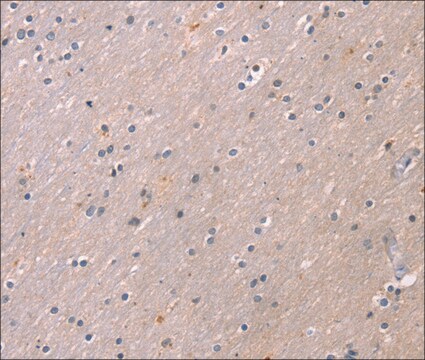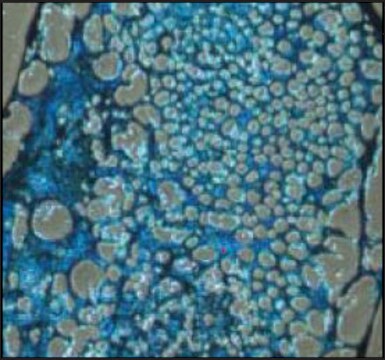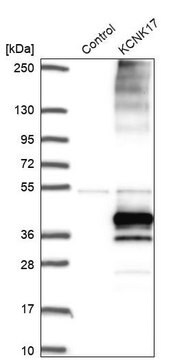推荐产品
生物源
mouse
品質等級
共軛
unconjugated
抗體表格
purified from hybridoma cell culture
抗體產品種類
primary antibodies
無性繁殖
KCN-75, monoclonal
形狀
buffered aqueous solution
分子量
antigen ~40 kDa (representing the KCNK9 monomer, and a weaker band at 80 kDa representing the KCNK9 dimer)
物種活性
human
技術
immunocytochemistry: suitable
indirect ELISA: suitable
microarray: suitable
western blot: 4-8 μg/mL using whole extract of cultured T-47D cells (human breast carcinoma)
同型
IgG2b
UniProt登錄號
運輸包裝
dry ice
儲存溫度
−20°C
目標翻譯後修改
unmodified
基因資訊
human ... KCNK9(51305)
一般說明
Monoclonal Anti- KCNK9 (TASK-3), Clone KCN-75, (mouse IgG2b isotype) is derived from the KCN-75 hybridoma produced by the fusion of mouse myeloma cells (NS1) and splenocytes from BALB/c mice immunized with a synthetic peptide. Potassium two pore domain channel subfamily K member 9 (KCNK9) gene has been localized to the chromosomal region 8q24.
The gene KCNK9 (potassium two pore domain channel subfamily K member 9), also referred to as TWIK-related acid sensitive K(+) channel-3 (TASK-3), encodes a new member of the K2P (two pore domain K+ channel) family of proteins. It is found to be expressed in several rat tissues, such as brain, kidney, liver, lung, colon, stomach, spleen, testis, and skeletal muscle. It is also expressed to a lesser extent in heart and small intestine. All the potassium channels contain a conserved P domain that is involved in providing K+ selectivity and two, four, or six transmembrane segments.
免疫原
synthetic peptide corresponding to amino acids 360-374 in the C-terminus of human KCNK9.
應用
Anti-KCNK9 (TASK-3) antibody, Mouse monoclonal has been used in:
- immunoblotting
- immunohistochemistry
- immunocytochemistry
生化/生理作用
Potassium two pore domain channel subfamily K member 9 (KCNK9) is expressed in carcinomas including breast, lung, colon as well as in metastatic prostate. In 10% of breast cancer patients this gene is amplified, and in 44% the protein is overexpressed.
The gene KCNK9 (potassium two pore domain channel subfamily K member 9) encodes a tandem pore domain potassium channel that dimerizes to form a K+-selective pore. It is highly sensitive to change in pH and is involved in background leak potassium currents found in many cell types. The channel increases the hypoxia tolerance of malignantly transformed cells and facilitates its proliferation and/or survival. It may serve as a potential target for cancer therapies. Mutations in this gene can cause defects in the neuronal migration and have been associated with Birk Barel mental retardation dysmorphism syndrome. This oncogenic potassium channel is found to be expressed in epithelial ovarian cancer and patients with increased expression of this protein have better survival rates.
外觀
0.01M 磷酸缓冲盐溶液,pH 7.4,含 15mM 叠氮化钠。
免責聲明
Unless otherwise stated in our catalog or other company documentation accompanying the product(s), our products are intended for research use only and are not to be used for any other purpose, which includes but is not limited to, unauthorized commercial uses, in vitro diagnostic uses, ex vivo or in vivo therapeutic uses or any type of consumption or application to humans or animals.
未找到合适的产品?
试试我们的产品选型工具.
儲存類別代碼
10 - Combustible liquids
水污染物質分類(WGK)
nwg
閃點(°F)
Not applicable
閃點(°C)
Not applicable
Oncogenic potential of TASK3 (Kcnk9) depends on K+ channel function
Pei L, et al.
Proceedings of the National Academy of Sciences of the USA, 100(13), 7803-7807 (2003)
TASK-5, a new member of the tandem-pore K(+) channel family.
Kim D and Gnatenco C
Biochemical and Biophysical Research Communications, 284, 923-930 (2001)
TASK-3, a novel tandem pore domain acid-sensitive K+ channel. An extracellular histiding as pH sensor.
Rajan S
The Journal of Biological Chemistry, 275, 16650-16657 (2000)
Expression and prognostic significance of the oncogenic K2P potassium channel KCNK9 (TASK-3) in ovarian carcinoma.
Innamaa A
Anticancer Research, 33, 1401-1408 (2013)
Recovery of current through mutated TASK3 potassium channels underlying Birk Barel syndrome.
Veale EL
Molecular Pharmacology, 85, 397-407 (2014)
我们的科学家团队拥有各种研究领域经验,包括生命科学、材料科学、化学合成、色谱、分析及许多其他领域.
联系技术服务部门






